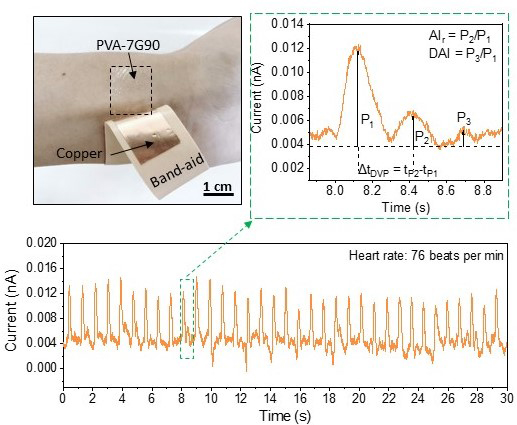Jul 23 2020
An invention might change one of the most extensively used materials for biomedical applications into wearable devices that can help track cardiovascular health.
 A team from Purdue University developed self-powered wearable triboelectric nanogenerators with polyvinyl alcohol-based contact layers for monitoring cardiovascular health. Image Credit: Purdue University.
A team from Purdue University developed self-powered wearable triboelectric nanogenerators with polyvinyl alcohol-based contact layers for monitoring cardiovascular health. Image Credit: Purdue University.
At Purdue University, a research team has created self-powered wearable triboelectric nanogenerators (TENGs) that include polyvinyl alcohol (PVA)-based contact layers for tracking heart health. TENGs support by preserving mechanical energy and convert it into power.
The study was recently published in the Advanced Materials journal.
The PVA-based TENGs show great potential for self-powered biomedical devices and open doors to new technologies that use widely deployed biocompatible materials for economically feasible and ecologically friendly production of functional devices in energy, electronics and sensor applications.
Wenzhuo Wu, Ravi and Eleanor Talwar Rising Star Assistant Professor, Industrial Engineering, College of Engineering, Purdue University
Wu continued, “We transform PVA, one of the most widely used polymers for biomedical applications, into wearable, self-powered triboelectric devices which can detect the imperceptible degree of skin deformation induced by human pulse and capture the cardiovascular information encoded in the pulse signals with high fidelity.”
Cardiovascular health is normally quantified using echocardiogram to measure the heart’s electrical activity or using photoplethysmography that quantifies variations in blood volume in the peripheral microvasculature.
These technologies can often be invasive to patients and have not yet been adapted into wearables for personalized on-demand monitoring. TENGs with PVA blend contact layers produce fast readout with distinct peaks for blood ejection, blood reflection in the lower body, and blood rejection from the closed aortic valve, which may enable detection of common cardiovascular diseases such as cardiovascular disease, coronary artery disease and ischemic heart disease.
Wenzhuo Wu, Ravi and Eleanor Talwar Rising Star Assistant Professor, Industrial Engineering, College of Engineering, Purdue University
According to Wu, PVA could be applied as prospective constituents in wearable self-powered devices of the future. The PVA-based triboelectric devices have the ability to tap the mechanical energy from the human body and use the electric power to assist the operations of other biomedical devices.
Wu added that the PVA-based triboelectric devices could act as self-powered sensors to detect and track the mechanical activities from the human body in applications such as consumer electronics, teleoperated robotics, human-machine interface, health monitoring, and virtual and augmented technologies.
The researchers collaborated with the Purdue Research Foundation Office of Technology Commercialization to obtain a patent for the technology.
Journal Reference
Wang, R., et al. (2020) Holistically Engineered Polymer–Polymer and Polymer–Ion Interactions in Biocompatible Polyvinyl Alcohol Blends for High-Performance Triboelectric Devices in Self-Powered Wearable Cardiovascular Monitorings. Advanced Materials. doi.org/10.1002/adma.202002878.
Source: https://www.purdue.edu/